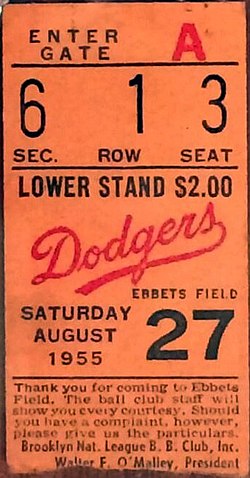| 1955 Brooklyn Dodgers | |
|---|---|
| World Series champion National League champion | |
 | |
| League | National League |
| Division | National League |
| Ballpark | Ebbets Field |
| City | Brooklyn, New York |
| Owners | Walter O'Malley, James & Dearie Mulvey, Mary Louise Smith |
| President | Walter O'Malley |
| General managers | Buzzie Bavasi |
| Managers | Walter Alston |
| Television | WOR-TV |
| Radio | WMGM Vin Scully, Connie Desmond, André Baruch, Al Helfer WHOM Buck Canel |
In 1955, the Brooklyn Dodgers finally fulfilled the promise of many previous Dodger teams. Although the club had won several pennants in the past, and had won as many as 105 games in 1953, it had never won a World Series. This team finished 13.5 games ahead in the National League pennant race, leading the league in both runs scored and fewest runs allowed. In the World Series, they finally beat their crosstown rivals, the New York Yankees. It was the Dodgers' first and only World Series championship won while located in Brooklyn. With their World Series victory, the '55 Dodgers became only the second wire-to-wire team (a team leading from opening day to season's end) in MLB history after the '27 Yankees.
Contents
- Offseason
- Regular season
- MVP controversy
- Season standings
- Record vs. opponents
- Opening Day Lineup
- Notable transactions
- Roster
- Player stats
- Batting
- Pitching
- 1955 World Series
- Game 1
- Game 2
- Game 3
- Game 4
- Game 5
- Game 6
- Game 7
- Awards and honors
- All-Stars
- League top five finishers
- Farm system
- Aftermath and legacy
- 50th Anniversary
- References
- External links
